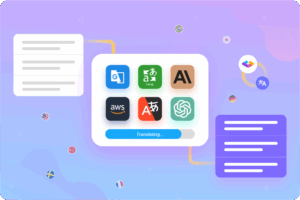In this installment of our Interpreter Skills series, we’re going to cover notetaking. Taking notes while interpreting is both a skill and an asset. When executed properly, note-taking becomes an essential part of your interpreting. There are three aspects to consider: the tools you’ll use, what to note, and how to note it during a session. Even if you start small, noting only the essentials will help you become more comfortable as a working interpreter. Let’s start with the basics: the (literal) tools of the trade:

Note taking Supplies
As an interpreter, you should always prep your bag ahead of your assignments
In your bag, you should have a pen or pencil and notebook. An excellent compromise between pens and pencils is to use an erasable pen. They’re the best of both worlds—they write like a ballpoint and erase like a pencil. This allows for smooth, professional, bold notes with no visible errors. Find what works for you! We do suggest that you use a notebook with pages that are easily ripped out.
This way, you’ll have no problem discarding your notes before leaving the assignment, in front of the client. We also recommend that you don’t use a fountain pen. They’re occasionally considered weapons because of their removable nibs so they’re banned from Mental Health Facilities, especially. They also sometimes leak. If you’re not a fan of writing in ink, pencils also work well. We recommend mechanical pencils if you’re going that route. This helps avoid scenarios where you’re preparing to take notes and realize your pencil has no point. In any case, be sure to carry a backup. You’re never going to think to yourself “Wow, I wish I weren’t carrying that extra pen.”
So: Now that you have the items you need, let’s talk about technique.
Important Details to Note
While you don’t need to note everything, especially when starting out, it’s important to write down the essentials
There are a couple details to focus on when writing notes during consecutive interpreting:
- Dates (for example, follow-up appointments)
- Times and frequency (ex: 10:30 AM, or “twice a day, morning and night”)
- Numbers and dosages
- Names, including medication names
- Places and addresses
- Key words
- Words you don’t understand, even in context, but think may be important. If this happens, step out from your role as language conduit and into your role as clarifier. Say “Excuse me, the interpreter would like some clarification. Can you please explain ______ this word?” Interpret for both parties as you always do during your time as a clarifier. If you need to use your dictionary, explain this, then use it. When you’re finished, say “Thank you, please continue the session” to both parties in both languages.
These are the parts of the conversation you’re going to want to write down during the session. Writing them down ensures that both parties receive the whole message and nothing’s lost. Let’s talk about how you’ll write them.
Note taking Techniques
There are many ways to take notes and different styles work for different people. As with interpreting itself, practice makes perfect. We highly suggest looking at books and resources for interpreting shorthand. Unlike traditional shorthand, the goal isn’t to transcribe the entire speech. The goal is to use symbols (Ideograms) to represent commonly used words/phrases. This essentially helps you build “stepping stones” that allow you to interpret accurately and in detail. Interpreting shorthand books can help acquaint you with some of the most common interpreting Ideograms. You’ll also find that you develop your own shorthand techniques as you become more and more comfortable with note taking.
General guidelines for taking notes, no matter your level:
- Try to take as few notes as possible. Only note the important things we talked about on the last slide.
- Separate sentences, thoughts, or themes with a horizontal line
- Use existing symbols that you’ve memorized, or symbols that are easily recognizable. Don’t make up a new, not-easily-recognizable signal during the interpreting session.
- Be consistent in your abbreviations: “ind” shouldn’t mean “indirectly” in one case and “independently” in another.
- When writing names (of people or medications or places) don’t worry about the spelling in your notes–focus more on how they sound than actual spelling. When in doubt, write it out phonetically.
- Write your notes in the target language: the language to which you’ll be interpreting. If you can’t remember a word in the target language immediately, note it in the source language instead. This helps you not get “stuck” on a word.
Remember: the goal isn’t to be stressed about note taking! The goal is to give you another tool to help you interpret effectively and fluently. Note taking comes with practice. We suggest taking notes while watching TV, especially medical shows. Use their patient advice monologues to practice. Netflix is great for this as you can then go back and re-watch the scene to make sure you’ve noted and interpreted properly. Keep at it and your interpreting performance will thank you!
Global Arena’s Interpreting Program
Need some interpreting practice? Want to meet industry peers and engage in discussion and activities? Global Arena’s interpreting program offers just that. We designed our program to give a firm foundation for new interpreters just starting in the industry. The course is activity and discussion-based: plenty of opportunity for collaboration and practice. Experienced interpreters also benefit from brushing up on their skills and industry knowledge. The course takes place over zoom, on four consecutive days, from 8:30 am- 12:30 PM EST. Participants receive a welcome packet with reference materials, including medical and legal glossaries. You’ll also receive a certificate of completion upon passing exam score: useful for interpreting applications and resume-building. Learn more about Global Arena’s Interpreting Program and sign up.







